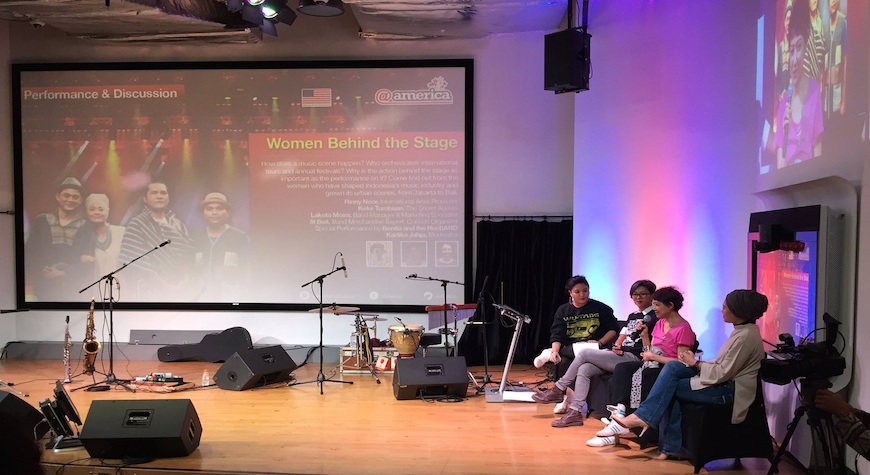 Music industry is commonly perceived as a men’s field in Indonesia, too tough or too rough for women. But several women who have dedicated their lives to promoting the music scene in Indonesia prove this assumption wrong. These women shared their stories last week during the discussion “Women Behind the Stage” at @america, moderated by activist and musician Kartika Jahja.
Music industry is commonly perceived as a men’s field in Indonesia, too tough or too rough for women. But several women who have dedicated their lives to promoting the music scene in Indonesia prove this assumption wrong. These women shared their stories last week during the discussion “Women Behind the Stage” at @america, moderated by activist and musician Kartika Jahja.
One of the women is Rinny Noor, one of the pioneering music promoters in Indonesia and the first woman ever arrange the concert of the legendary Mick Jagger in 1989.
Back then it was difficult to bring in international artists to countries that was not widely recognized like Indonesia. But Rinny Noor, accompanied by her diplomat father, contacted the rock concert promoter Bill Graham to request a consultation and supervision to hold a concert of international artists in Indonesia.
Cindy Fattah, Rinny Noor’s daughter, who represented her in the discussion, said that Rinny’s nerve surprised and impressed Graham.
“Just imagine, in those years, my mother, a woman with a petite stature, went to San Francisco and asked an established world-class promoter to help her conduct a big rock concert in Indonesia,” said Cindy.
“Surprisingly, Bill Graham was excited about the proposal. He drew out a world map and asked her to point where exactly Indonesia is, where exactly Jakarta is.”
The concert did not start well with protests and brawls happening outside the gate. Back then Indonesian people were not used to paying for concert, so they demanded to get in for free.
“She almost let them all in because it was too chaotic, but then she realized she should start educating Indonesian people to appreciate music, so she did not open the gate until the end,” said Cindy.
In the end, the concert was successfully held and Rinny has paved the way for later generation of Indonesian promoters. She had since promoted the concerts of Beyoncé, Linkin Park, Duran-Duran, Craig David and Hanson in Indonesia.
Keeping local bands alive
In Bandung, West Java, Iit Boit has been helping local bands stay alive by distributing their merchandise and organizing concerts. In the beginning, she did not know as much about music as she did literature, so when she and her husband started a business, it was a small bookshop called Omuniuum. Later she decided to start selling the merchandise of an indie band, Seringai, at her bookshop, but during the negotiation, she was offered to distribute several other bands’ merchandise.
“I knew nothing about local bands back then, but once I started selling indie band’s merchandise, my customers also demanded information about what those indie bands were up to. Eventually I started watching their gigs, I got to know the band members, I asked about their coming up albums simply so that I could tell my customers about it,” she said.

As a result Omuniuum became a place to network and to build a community as well as to hold gigs for emerging artists. The merchandise selling developed rapidly as the demands keep rising. In fact, often the bands were unable to meet customers’ demand, because production depends on the bands’ financial capability. Because of that Iit and her husband decided to collaborate with the bands to produce their merchandise.
“We still produce merchandise using the band’s label and not Omuniuum because we are not here for profits. We’re here to help local bands gain more exposure,” she said.
Women’s experience in music
Lakota Moira started as a photographer before she was hired as the manager of Bali-based indie band, Navicula. While following the band’s tours, she often finds herself the only woman in the circle.
“The band members and crew often look out for me during concerts with a big crowd. But I believe it shouldn’t be that way. The music scene should be a safe place for women,” said Lakota.
Iit Boit recalled working with sponsors who tend to favor dealing with men over women.
“Once when we were working with a big cigarette company, my husband had to step forward, because we knew they were not used to work with women. Yes, it happens – some people might admire women in the music scene, but others might be reluctant or put off because of it,” said Iit Boit.
Often people assume that they are dealing with men, which is why nearly all the women in the discussion said they were often mistaken as a guy by the people who contacted them but who had not met them in person.
Iit Boit said that most of the time her customers called her “Bro” or “Bang Boit” (Brother Boit) on text messages and phone calls or at the store. Lakota said she is often called “Mas Lakota” (Brother Lakota).
Producer and photographer Keke Tumbuan, who also experiences the same thing, said: “When they do that to me, I simply won’t reply until they get it right.”
Society still considers women too fragile to be part of the music industry, Keke said, so people assume they would only be dealing with men. Unfortunately, women themselves often leave the music scene for similar reasons.
“Many of my friends stopped once they started a family or once they became more religious,” she said.
“But it shouldn’t be have to be that way. Those things are not necessarily contradictory. If you love what you’re doing, you should keep doing it,” she added.
Find out about this campaign that champions diverse female bodies in the media.









Comments